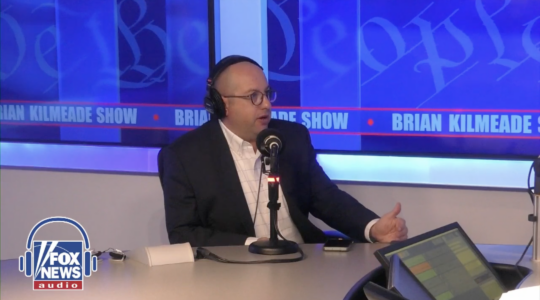TEL AVIV (JTA) — When Israeli Prime Minister Benjamin Netanyahu blamed Haj Amin al-Husseini, the mufti of Jerusalem prior to the establishment of Israel, for inspiring Hitler to exterminate the Jews of Europe, he meant to show the long history of Palestinian anti-Semitism.
Regardless of his intent, Netanyahu was hit with a tsunami of backlash from historians and politicians who accused him of distorting history. Yad Vashem, the Anti-Defamation League and the German government have all criticized the historical accuracy of the prime minister’s claim, with Chancellor Angela Merkel’s spokesman even reiterating German responsibility for the genocide.
Netanyahu walked back the statement on Wednesday, saying he had “no intention to absolve Hitler of responsibility for his diabolical destruction of European Jewry.”
Here’s who the mufti was, how he felt about a Jewish state, and what really happened between him and Hitler.
A hard-line Palestinian nationalist
Born in Jerusalem near the turn of the 20th century, Husseini came from a prominent Palestinian family. In 1921, Palestine’s British rulers installed him as the grand mufti of Jerusalem, a religious leadership position.
Husseini was an advocate for Arab nationalism, and in 1936 he joined with other Palestinian leaders in revolt against the British. The revolt lasted until 1939, claimed thousands of lives, including hundreds of Jews, and led the British to seek an exit from the territory. In 1937, the British removed Husseini from his position, prompting him to flee to Lebanon.
During World War II, Husseini supported an anti-British rebellion in Iraq and became the rebels’ envoy to Germany and Italy. When the rebellion was suppressed, he fled to Italy and continued his contacts with the Axis powers from there, famously meeting with Adolf Hitler in November 1941. He continued to support the Nazis in various ways throughout the war.
After the war, Husseini escaped to Beirut, his influence diminished. He died there in 1974.
Husseini opposed Zionism
Husseini opposed any accommodation of a Jewish national home in what would become Israel. He opposed the 1939 British White Paper, despite its ban on Jewish immigration to Palestine, because it set too long a timeline for an Arab state. And he opposed the 1947 United Nations partition plan that sought to create neighboring Jewish and Palestinian states.
Husseini also backed violence against Jews. In 1920, he organized an anti-British demonstration in Jerusalem that grew violent and was subsequently convicted of incitement.
Support for Hitler’s Final Solution
The source of Netanyahu’s claim that Husseini bears responsibility for the Holocaust stems from his famous meeting with Hitler on Nov. 28, 1941. Husseini at the time was seeking German support for Arab independence from colonial rule, and records of the meeting attributed to a British archive show that Husseini focused his requests on a formal Nazi declaration of support for “the independence and unity of Palestine, Syria, and Iraq” under Arab rule.
According to the British record, Husseini told Hitler, “The Arabs were Germany’s natural friends because they had the same enemies as had Germany, namely the English, the Jews, and the Communists.” He also thanked Hitler for supporting “the elimination of the Jewish national home.”
Contrary to Netanyahu’s assertion, nowhere in the record is there a suggestion that Husseini told Hitler to exterminate Europe’s Jews. The record does report that Hitler announced his intentions, noting that he planned to “ask one European nation after the other to solve its Jewish problem.”
“To say Hitler was influenced by the mufti is far from the truth,” said Hebrew University professor Moshe Maoz. “He didn’t need the mufti to perform the extermination.”
Husseini is a father of Palestinian nationalism
According to Maoz, Palestinians today see Husseini as one of their national fathers. But their admiration is mitigated, he said, because Husseini was so strongly pro-Nazi and was ineffective in advancing the Palestinian cause.
His stature among Palestinians, Maoz said, pales to that of Yasser Arafat, whose memory enjoys near universal reverence. But Palestinians tend not to criticize Husseini in public, Maoz said, because they want to display unity.
“Not a few Palestinians think he wasn’t so positive,” Maoz said. “He was very stubborn. But those who oppose him don’t emphasize it out of solidarity.”
JTA has documented Jewish history in real-time for over a century. Keep our journalism strong by joining us in supporting independent, award-winning reporting.





